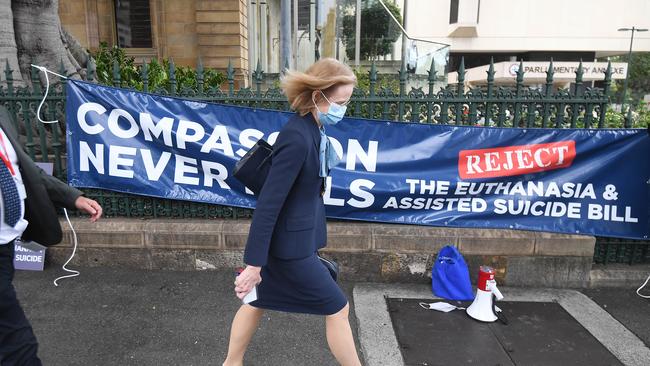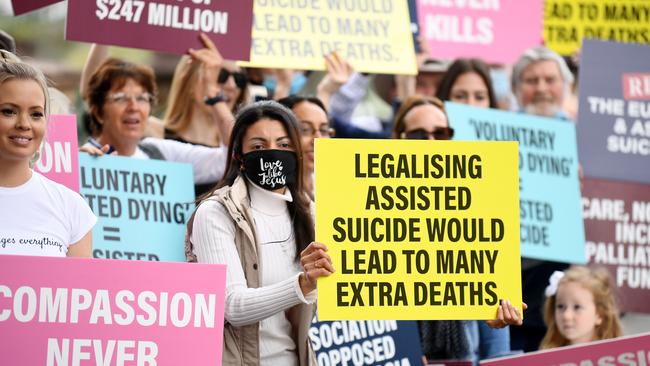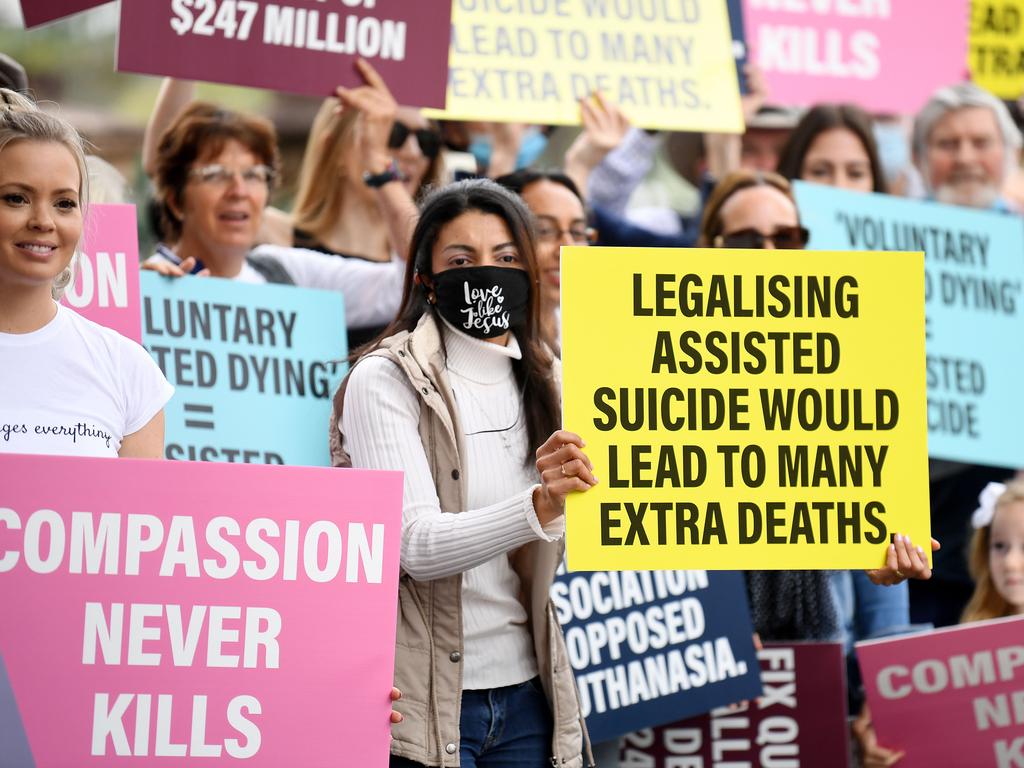Truth is, a choice not to continue living should be respected
In a nation not noted for gifted wordsmiths, Noel Pearson is a glittering exception. But his column on euthanasia was just plain wrong.

In a nation not noted for gifted wordsmiths, Noel Pearson is a glittering exception. When Pearson speaks, we lean in, drawn by his soft and measured words.
Perhaps that’s why his article in Inquirer last Saturday in response to the passing of Queensland’s voluntary assisted dying law felt so jarring. The language imperious, the tone scornful, and in some instances he was just plain wrong.
Declaring that our deaths are a matter of “fundamental philosophy”, Pearson writes “the choice to die was not one that society ever sanctioned”, echoing the words of Paul Keating who, in 2017, launched a missile into the middle of Victoria’s parliamentary debate.
“No matter what justifications are offered for the bill,” Keating wrote, “it constitutes an unacceptable departure in our approach to human existence.”
To hear Keating and Pearson tell it, when it comes to the sanctity of human life – even when we are dying – there is a bright shining line that no civilisation, and no doctor, should ever cross.
It is time to put this fiction to rest. In Australia, courts and parliaments have long recognised that there are situations where a choice not to continue living should be respected.
Before assisted dying became legal in five states, the law permitted the hastening of death by refusing medical treatment, food and water. Though it may take weeks, the law did not call this suicide, rather a choice that was medically supported and must be legally respected.
Our laws allow life-sustaining equipment to be removed or switched off: feeding tubes, dialysis machines, respirators. This can even be against the wishes of a dying person’s treating team if that is what the person truly wants. Our laws give substitute decision-makers power to refuse medical treatment for an incompetent person, which can result in their death.
Our laws allow a doctor to sedate a dying person into a coma from which they will never awake to ease their suffering, and to do so without consulting them or their family. This was confirmed in 2018 by West Australian, now federal, Australian Medical Association president Omar Khorshid, who told journalists: “We shorten patients’ lives regularly if that is the right thing to do at the very end of life.”
And our laws permit suicide – tragically, a choice too many terminally ill Australians make.
Pearson’s assertion that, in making assisted dying legal, Australian parliaments have “led the world down a new path for humankind, something unprecedented in all of human … history” discounts the nearly 300 million people living in the two dozen or so jurisdictions in Europe, North America and South America who, since 1997, have passed similar laws.
Pearson goes on to quote from prominent Indigenous senator Patrick Dodson’s 2018 speech against assisted dying: “Where First Nations people are already overrepresented at every stage of our health system, it is irresponsible to vote in favour of another avenue to death.”
While impossible to argue the first half of that statement, the second half fails to acknowledge that First Nations people speak with many voices on this issue.
In the Northern Territory in 1995, it was Wesley Lanhupuy, the Indigenous member for Arnhem, whose casting vote allowed the world’s first euthanasia law to pass. Recalling the trauma of his wife’s death from cancer, he said: “I believe a person should have the right to be able to determine what they want if they are of sane mind.”
In South Australia in June, it was opposition legal affairs spokesman Kyam Maher, recently initiated on Yungkunjara country, who successfully introduced that state’s legislation. As he tabled the bill, Maher detailed the painful death from pancreatic cancer of his mum, Viv, one-time chair of the Mount Gambier Aboriginal Legal Service.
In July Wongatha-Yamatji woman Mary-Ellen Passmore, 63, became one of the first to die under Western Australia’s Voluntary Assisted Dying Act. After 12 years of motor neurone disease, barely able to speak or swallow, she said: “It is terrifying being trapped by your own body and it’s a relief to know there will be an end to my suffering.”
And two weeks ago, in Queensland’s parliament, it was Cynthia Lui, the member for Cook, Lamalaig woman from the Kulkalgau Clan of Lama (Yam Island) and the Kulkalgal Tribe of the Torres Strait, who spoke in support of assisted dying.

Through unchecked tears she recalled her close friend Duncan, for whom the law had come too late, and explained how she recently had returned to Yam Island to reconcile “with loved ones we have lost in the community”, in keeping with her cultural practices. Yet it was these tears – and those of other Queensland MPs – at which Pearson levelled scorn.
“These parliamentarians think the question of assisted dying is first a matter of emotion,” he wrote. ‘So, Hansard records days of emotional speechifying, with MPs delivering tearful performances like actors winning baubles at the Academy Awards, the whole spectacle ending with cathartic applause. Who gave these people the emotional monopoly on the subject of suffering facing death?”
Tearful performances? Speechifying? Such a cruel dismissal of people expressing their pain. Over three days, MPs from across the political compass spoke not only of their personal pain after witnessing family members dying in terrible ways but of those they represent.
Of people twisting in the vice of incurable illness that inevitably would take their life. Families fearful of what those they love are being forced to endure. First responders describing the post-traumatic stress disorder they suffer when a terminally ill person takes their own life (“no family should have to clear the remnants of their relative from their driveway”). Adults reduced to nappies and hoists; beloved parents, some barely more than skeletons, begging for someone to “finish them off”; agonising deaths through starvation.
In dismissing Queensland’s politicians as “actors winning baubles” for bearing witness to such trauma, he not only minimises, he also misunderstands the seriousness of their purpose.
In the months heading in to the debate, I managed to speak with almost half the parliament. For many, it was the single most important piece of legislation they would ever speak to.
They did community forums, met people of diametrically opposed views, ran polls, received petitions, emails and handwritten entreaties by the metre. Many read the Queensland Law Reform Commission’s entire 800-page report, with its detailed explanation of the law they were being asked to consider and the reasoning behind it.
Not all voted for. Some who did, did so with a heavy heart: less certain than Pearson that dying is a matter of absolutes.
His cynicism towards them made me feel sad. Sad, to see a good man speak without kindness. Whatever his upbringing may teach him about the sanctity of life, the work of Queensland’s politicians in legalising assisted dying was no charade, any more than the intimate stories of trauma entrusted to them by their voters. By listening carefully to the evidence, and faithfully representing the will of their communities, they demonstrated the quality we are forever demanding of our elected representatives: integrity. Surely, this deserves better than scorn?
Andrew Denton is the founder of Go Gentle Australia.




To join the conversation, please log in. Don't have an account? Register
Join the conversation, you are commenting as Logout